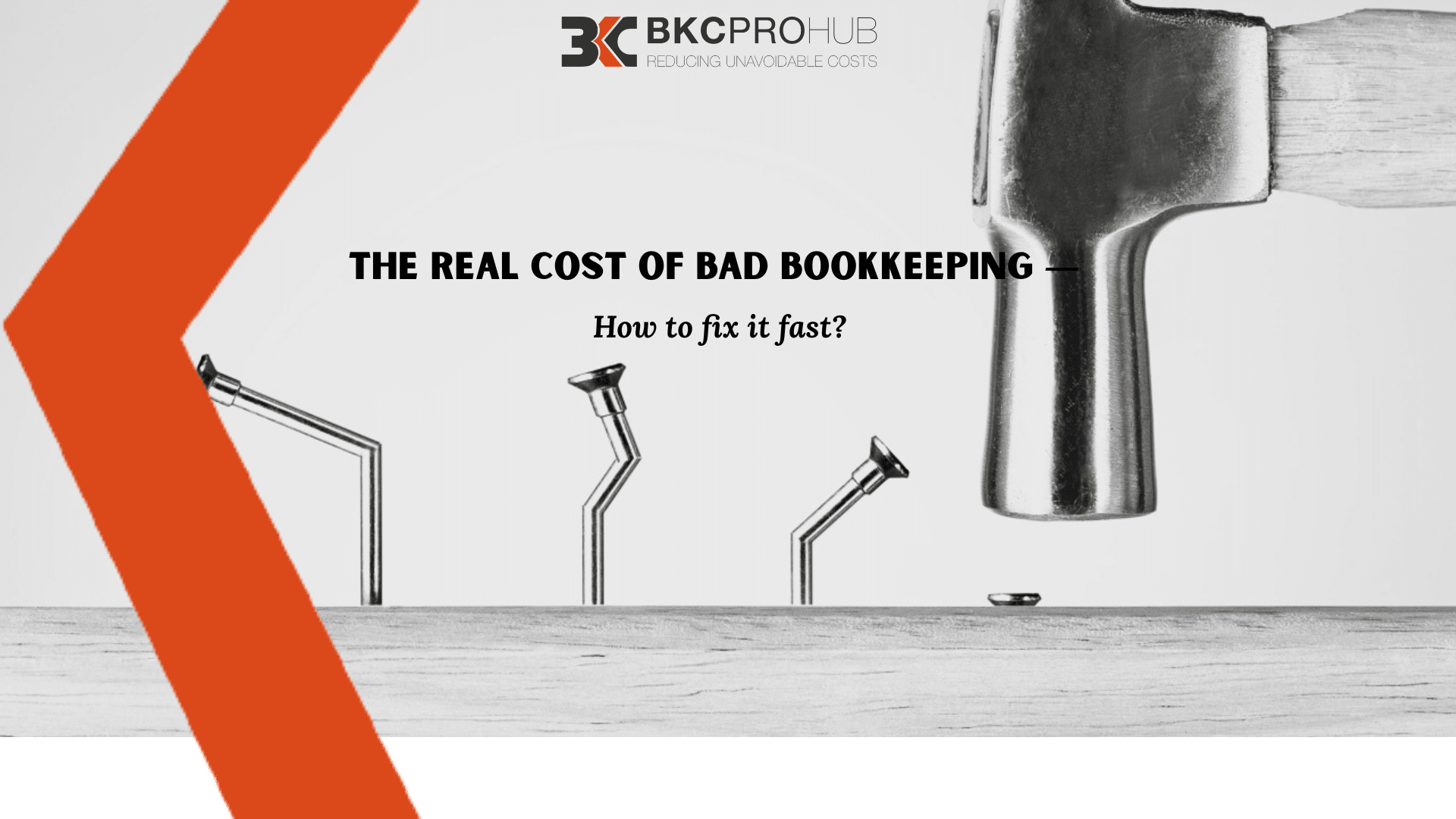The Real Cost of Bad Bookkeeping (and How to Fix It Fast)
Every business owner knows that bookkeeping is essential, but few realize just how expensive poor bookkeeping can be. From missed tax deductions to compliance penalties, the cost of bad bookkeeping extends far beyond disorganized spreadsheets. For small to medium-sized businesses, these errors can mean the difference between profitability and financial distress.
In this comprehensive guide, we’ll explore the true financial impact of inadequate bookkeeping, identify warning signs your books need attention, and show you how to fix bookkeeping problems quickly and cost-effectively.
The Hidden Financial Costs of Bad Bookkeeping
Direct Financial Losses
Poor bookkeeping doesn’t just create headaches—it drains your bottom line in measurable ways. According to the U.S. Small Business Administration, accounting errors and poor financial management are among the top reasons small businesses fail within their first five years.
Tax Overpayments and Missed Deductions
When your books are inaccurate or incomplete, you’re likely paying more taxes than necessary. The average small business misses out on $3,000 to $10,000 in legitimate tax deductions annually due to poor record-keeping, according to IRS data. Common missed deductions include:
Business mileage and vehicle expenses
Home office deductions
Professional development and training costs
Equipment depreciation
Business insurance premiums
Late Payment Penalties and Interest
Disorganized books lead to missed payment deadlines. The IRS charges a failure-to-pay penalty of 0.5% of unpaid taxes per month, up to 25% of your total tax bill. State and local tax authorities impose similar penalties. For a business owing $50,000 in taxes, a three-month delay could cost an additional $750 in penalties alone—not including interest charges.
Bank Overdraft and NSF Fees
Without accurate cash flow tracking, businesses frequently overdraw accounts or bounce checks. At $35 per overdraft fee, businesses with poor bookkeeping can rack up hundreds or thousands in unnecessary banking fees annually.
Opportunity Costs
The cost of bad bookkeeping extends beyond direct financial losses to missed opportunities that could have grown your business.
Inability to Secure Financing
Lenders require accurate financial statements to approve business loans or lines of credit. According to a Federal Reserve study, 43% of small business loan applications are rejected, with poor financial documentation being a leading cause. When growth opportunities arise, businesses with inadequate bookkeeping can’t move quickly to secure necessary capital.
Poor Business Decisions
Without reliable financial data, you’re essentially flying blind. You might continue investing in unprofitable product lines, miss cash flow crunches until it’s too late, or fail to identify your most valuable customers. The Harvard Business Review reports that data-driven businesses are 5% more productive and 6% more profitable than their competitors.
Lost Time and Productivity
Business owners spend an average of 120 hours per year on bookkeeping and tax preparation, according to the National Small Business Association. When books are disorganized, this time doubles or triples. For a business owner whose time is worth $100 per hour, poor bookkeeping represents $12,000 to $36,000 in lost productivity annually.
Industry-Specific Impacts of Poor Bookkeeping
Healthcare Practices
Medical practices face unique bookkeeping challenges with insurance reimbursements, patient billing, and strict HIPAA compliance requirements. Poor bookkeeping in healthcare can lead to:
Uncollected patient balances averaging 15-20% of revenue
Insurance claim denials due to coding errors
Compliance violations with penalties up to $50,000 per violation
Inability to track profitability by service line or provider
Manufacturing and Assembly
Manufacturing businesses deal with complex inventory valuation, cost of goods sold calculations, and job costing. Inadequate bookkeeping results in:
Inaccurate inventory counts leading to production delays
Inability to calculate true product profitability
Cash flow problems from poor accounts receivable management
Lost volume discounts from suppliers due to poor purchase tracking
Real Estate
Real estate businesses manage multiple properties, security deposits, and capital improvements. Bookkeeping errors create:
Commingled funds violating state regulations
Missed depreciation deductions worth thousands annually
Tenant disputes over security deposits and charges
Inability to demonstrate property profitability to investors
Law Firms
Legal practices must maintain trust accounts and track billable hours precisely. Poor bookkeeping leads to:
Trust account violations risking bar sanctions
Unbilled time representing 10-15% of potential revenue
Difficulty tracking matter profitability
Compliance issues with IOLTA requirements
Financial Services
Financial advisory and services firms face regulatory scrutiny requiring impeccable records. Inadequate bookkeeping causes:
Regulatory compliance failures and potential fines
Inability to pass audits from regulatory bodies
Poor expense tracking affecting profitability analysis
Client billing disputes and revenue leakage
Warning Signs Your Bookkeeping Needs Immediate Attention
Recognizing the symptoms of poor bookkeeping early can save your business thousands. Watch for these red flags:
Financial Statement Red Flags
Unreconciled accounts: Bank and credit card accounts that haven’t been reconciled in over 30 days
Negative inventory: Inventory quantities showing negative numbers
Unbalanced books: Assets don’t equal liabilities plus equity
Stale transactions: Uncategorized transactions older than 60 days
Round numbers everywhere: Financial statements with suspiciously round figures suggesting estimates rather than actual data
Operational Warning Signs
You can’t answer basic questions like “What was last month’s profit?” or “How much cash do we have available?”
Tax filing deadlines consistently require extensions
You discover errors only when your accountant reviews your books quarterly or annually
Vendor relationships are strained due to late or missed payments
You’re unable to provide financial statements when opportunities arise
Compliance and Accuracy Issues
Receiving notices from tax authorities about discrepancies
Difficulty passing audits or regulatory reviews
Inability to provide documentation for business expenses
Payroll tax filing errors or late deposits
Sales tax collection and remittance problems
The True Cost: A Real-World Example
Consider a mid-sized manufacturing company with 25 employees and $2 million in annual revenue. Their bookkeeper left, and for six months, the owner handled bookkeeping sporadically while searching for a replacement. Here’s what it cost them:
Missed tax deductions: $8,500
Late payment penalties (federal and state): $3,200
Bank overdraft fees: $840
Lost early payment discounts from suppliers: $4,000
Accountant fees to clean up the mess: $6,500
Owner’s time (200 hours at $150/hour): $30,000
Delayed loan approval costing a growth opportunity: $50,000 (estimated)
Total cost of six months of poor bookkeeping: $103,040
This represents over 5% of their annual revenue—money that could have been invested in growth, equipment, or employee development.
How to Fix Bad Bookkeeping Fast
The good news? Bookkeeping problems are fixable, and the sooner you address them, the less they’ll cost.
Step 1: Conduct a Bookkeeping Audit
Start with a comprehensive assessment of your current situation:
Review the last 12 months of bank and credit card statements
Identify unreconciled accounts and uncategorized transactions
Check for mathematical errors and duplicate entries
Verify that all income and expenses are properly recorded
Ensure sales tax and payroll tax filings are current
Step 2: Implement Proper Systems and Processes
Modern bookkeeping requires the right tools and workflows:
Choose appropriate accounting software: QuickBooks, Xero, NetSuite, or industry-specific solutions
Establish a chart of accounts: Properly categorize all income and expense types
Create Standard Operating Procedures: Document how transactions should be recorded, when reconciliations occur, and who’s responsible for each task
Set up automation: Connect bank feeds, automate recurring transactions, and use receipt capture technology
Schedule regular reconciliations: Weekly for high-volume accounts, monthly minimum for all accounts
Step 3: Get Expert Help
Attempting to fix years of bookkeeping problems alone is overwhelming and often makes things worse. Professional bookkeeping services can:
Clean up historical records efficiently
Implement best practices specific to your industry
Provide ongoing accuracy with expert oversight
Deliver financial reports you can actually use for decision-making
Ensure compliance with tax and regulatory requirements
At BKCProHub, we specialize in rapid bookkeeping remediation for businesses across healthcare, manufacturing, real estate, legal, and financial services. Our team of certified accountants can take over your bookkeeping within just 5 business days, delivering 99.99% accuracy with a 24-hour maximum turnaround time on all requests.
Step 4: Establish Ongoing Monitoring
Once your books are clean, maintain accuracy through:
Monthly financial statement reviews: Analyze profit and loss, balance sheet, and cash flow statements
Regular KPI tracking: Monitor metrics specific to your industry and business model
Quarterly strategic reviews: Use financial data to inform business decisions
Annual planning: Leverage accurate historical data for budgeting and forecasting
The ROI of Professional Bookkeeping
Investing in professional bookkeeping services delivers measurable returns:
Cost Savings
Outsourcing bookkeeping typically costs 53-75% less than hiring in-house staff when you factor in:
Salary and benefits for full-time employees
Training and continuing education costs
Software licenses and IT infrastructure
Management oversight and quality control
Backup coverage for vacations and sick days
For a business requiring 160 hours of bookkeeping monthly, the comparison is striking:
In-house bookkeeper:
Salary: $50,000/year
Benefits (30%): $15,000/year
Software and training: $2,000/year
Management time: $5,000/year
Total: $72,000/year
Professional bookkeeping service:
160 hours × $15/hour average: $28,800/year
Savings: $43,200 annually (60% reduction)
Improved Financial Performance
Businesses with accurate, timely bookkeeping experience:
Better cash flow management: Reduce cash crunches by 40% through accurate forecasting
Increased profitability: Identify and eliminate unprofitable products or services
Faster growth: Make data-driven decisions that accelerate expansion
Reduced stress: Eliminate the anxiety of not knowing your financial position
Risk Mitigation
Professional bookkeeping reduces your exposure to:
Tax penalties and interest charges
Audit failures and compliance violations
Fraud and embezzlement (through proper controls and oversight)
Litigation from financial disputes or regulatory issues
Why BKCProHub Is Your Fast Fix Solution
When your bookkeeping is in crisis, you need a partner who can deliver results quickly without sacrificing quality. BKCProHub has been helping businesses fix their bookkeeping problems since 2009, serving over 200 clients across six countries.
Our Unique Approach
Rapid Implementation: We get you up and running in just 5 business days, not weeks or months.
Unmatched Accuracy: Our 99.99% accuracy rate is achieved through automation combined with concurrent internal review by certified professionals with 30+ years of combined experience.
24-Hour Turnaround: Need a financial report or specific analysis? We deliver within 24 hours maximum.
Custom Solutions: We create Standard Operating Procedures tailored to your specific business, industry, and software platform.
Significant Savings: Reduce your accounting costs by 53-75% compared to in-house staff while improving quality.
Proven Results Across Industries
Our clients span healthcare, manufacturing, real estate, law firms, and financial services. We understand the unique challenges of each industry and deliver solutions that address your specific needs:
Healthcare: HIPAA-compliant systems with insurance reimbursement tracking
Manufacturing: Job costing, inventory valuation, and COGS analysis
Real Estate: Multi-property management with proper fund segregation
Law Firms: Trust account management and matter profitability tracking
Financial Services: Regulatory compliance and audit-ready documentation
Security and Compliance You Can Trust
With zero security breaches since our founding, we maintain:
24/7 CCTV monitoring
Two-factor authentication on all systems
Controlled network access
Paperless, encrypted document handling
Zero-tolerance compliance policy
Take Action Today
The cost of bad bookkeeping compounds daily. Every day you delay addressing bookkeeping problems, you’re potentially:
Missing tax deductions
Incurring late payment penalties
Making uninformed business decisions
Risking compliance violations
Losing opportunities that require financial documentation
The solution is straightforward: get professional help now. With BKCProHub, you can have clean, accurate books within a week and ongoing peace of mind knowing your financial records are maintained to the highest standards.
Ready to fix your bookkeeping fast? Contact BKCProHub today for a free consultation. Discover how we can transform your financial chaos into clarity while saving you 53-75% compared to traditional solutions.
Don’t let poor bookkeeping cost your business another dollar. The investment in professional bookkeeping services pays for itself many times over through tax savings, avoided penalties, improved decision-making, and the time you’ll reclaim to focus on growing your business.
Your financial clarity is just one week away.
Lorem ipsum dolor sit amet, consectetur adipiscing elit. Ut elit tellus, luctus nec ullamcorper mattis, pulvinar dapibus leo.






